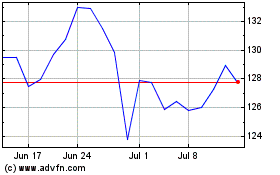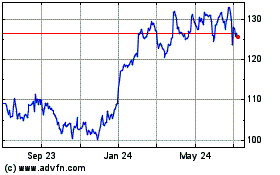By Paul Page
Sign up: With one click, get this newsletter delivered to your
inbox.
The world-wide cyberattacks that have plagued corporations are
hitting the shipping business in a big way. Container shipping
giant Maersk Line was among a raft of global companies and
institutions that were crippled by a virus similar to last month's
ransomware attack, with operations around the world rocked by the
hack. APM Terminals, another unit of A.P. Moeller-Maersk A/S,
halted handling at several ports, including New York-New Jersey.
The WSJ's James Marson, David Gauthier-Villars and Michael Amon
report other corporate victims of the Petya attack include
pharmaceutical giant Merck & Co. and Russian oil company PAO
Rosneft, and TNT Express, the European operating unit of FedEx
Corp., was also affected. The biggest impact may have been on
Ukrainian state institutions, but for a broad array of businesses
the attack on Maersk marked an alarming sign of the vulnerability
of supply chains to hacking. Maersk carries an outsize share of
global trade on its ships, leaving the potential financial pain
from the hack to reach companies far beyond the vessels
themselves.
Buying more tankers in an oversupplied market may seem foolhardy
to some, but shipping magnate John Fredriksen is used to sailing
against prevailing business currents. The self-made billionaire,
leader of tanker operator Frontline Ltd. and head of a troubled
offshore-drilling company tells the WSJ's Costas Paris that he's
still looking to expand his fleet even after two unsuccessful
takeover attempts of rival tanker firms. Mr. Fredriksen says he has
some $2 billion targeted for acquisitions, and is looking for the
biggest of tankers -- very large crude carriers, or VLCCs. His
reasoning: shipping companies will scrap three times as many
tankers this year than they did last year, with fewer new vessels
coming to market, placing a bigger premium on capacity. He's moving
in a depressed tanker market, but analysts note the shipping
veteran has always had strong timing. And he's trying to
consolidate in a business that so far has averted the sort of
consolidation that has marked the container shipping trade.
Takata Corp. may be going under, but the company isn't exactly
going away. The company's bankruptcy filing this week sets the
stage for the dissolution of the eight-decade-old auto-parts maker,
although the WSJ's Sean McLain and Mike Spector write that the
business could limp on for several years supplying parts for the
approximately 54 million defective air bags that still need to be
replaced in the U.S. alone. The unprecedented recall affects
roughly 16% of the 260 million vehicles now on American roads.
Takata is trying to get support from major car makers to support
efforts to save the auto-components business, and in the meantime
expects to sell itself to Key Safety Systems Inc. for $1.6 billion.
That's far less than Takata owes to car makers that have been
recalling vehicles, and it will leave new leadership to manage the
logistics behind the biggest and most complicated recall the auto
industry has faced.
E-COMMERCE
Blue Apron Inc. is hoping to sell investors on its initial
public offering, but the meal-kit maker's biggest challenge may be
finding customers. Company financial statements show that gaining
and retaining buyers of its home-delivery service is getting harder
and more expensive, the WSJ's Eliot Brown reports, highlighting the
tough economics behind many e-commerce startups. To live up to its
targeted $3 billion valuation, Blue Apron must replace a large
share of customers who quit after trying its food and lure ever
more people through ads and free offers. That's sent marketing
costs as a share of revenue soaring, pressing the business to keep
down spending in other areas while meeting its high logistics
demands. The reality for such startups is that the vast majority of
U.S. shopping still takes place in brick-and-mortar stores, and
customers of online startups can easily jump from one app to
another, making it difficult for a company to sustain growth.
United Parcel Service Inc. is taking bigger actions to pare its
growing pension burden. The package carrier plans to freeze pension
plans for about 70,000 nonunion employees, the WSJ's Paul Ziobro
and Vipal Monga report, seeking to corral a retirement fund with a
nearly $10 billion deficit. The company closed the pension plan to
new hires last year and offered buyouts to former workers, joining
major U.S. corporations looking to rein back a collective deficit
in the S&P 1500 pension plans that totaled $408 billion last
year. The deficits have persisted even as those firms contributed
more than $550 billion combined into the plans from 2008 to 2016,
pressing companies to look for more ways to stem the bleeding. The
concern has been growing at UPS, and remains a major issue in other
segments of the freight business. The Central States Pension Fund
covering retired unionized truck drivers has assets of barely half
of its obligations, and faces insolvency within the next
decade.
QUOTABLE
IN OTHER NEWS
Puerto Rico is shopping private stakes in seaports, airports and
other infrastructure, hoping to use private-public partnerships to
help the troubled U.S. territory's finances. (WSJ)
The International Monetary Fund cut its forecast for the U.S.
economy, saying it could no longer assume tax cuts and higher
infrastructure spending. (WSJ)
The Mexican peso rose to its highest level in more than a year
against the dollar. (WSJ)
U.S. home-price growth slowed in April for the first time in
months. (WSJ)
The Trump administration added a new layer of duties on imports
of Canadian lumber while saying it still hopes to negotiate a
settlement. (WSJ)
Western Digital Corp. submitted to Toshiba Corp. a new proposal
to buy their joint-venture chip business in partnership with
private equity company KKR & Co. (WSJ)
Industrial parts giant W.W. Grainger Inc. expects online sales
to account for 80% of the company's business within five years.
(Industrial Distribution)
Auto-parts startup Pearl Automation, launched by former Apple
Inc. engineers with $50 million in venture funding, shut down after
three years. (Axios)
Greek shipowners voted to voluntarily pay double tonnage taxes
for another year to help the country's struggling economy. (Lloyd's
List)
Singamas Container Holdings expects to swing to a first-half
profit on growing demand for its shipping containers. (Seatrade
Maritime)
Chinese container makers are retooling factories to switch to a
new, more environmentally-friendly paint. (Bloomberg)
Growth in the Port of New York and Jersey's loaded import
container volume slowed to 4.8% in May, down from 14% in April.
(American Shipper)
German discount grocer Lidl will build a fourth U.S.
distribution center, about 45 miles northwest of Atlanta, as it
adds more stores to its U.S. expansion. (Chain Store Age)
Grocer Kroger Co. will get a $2.1 million grant from Michigan to
build a distribution center north of Detroit. (Crain's Detroit
Business)
UPS expects to expand its use of alternative fuels from 19.6% to
40% by 2025. (Air Cargo World)
Growth in freight volume within China accelerated to 9.9% in
May. (Xinhua)
Veteran public relations executive Heath Hall was named deputy
director of the Federal Railroad Administration. (Progressive
Railroading)
ABOUT US
Paul Page is deputy editor of WSJ Logistics Report. Follow him
at @PaulPage, and follow the entire WSJ Logistics Report team:
@brianjbaskin , @jensmithWSJ and @EEPhillips_WSJ. Follow the WSJ
Logistics Report on Twitter at @WSJLogistics.
Write to Paul Page at paul.page@wsj.com
(END) Dow Jones Newswires
June 28, 2017 07:09 ET (11:09 GMT)
Copyright (c) 2017 Dow Jones & Company, Inc.
Merck (NYSE:MRK)
Historical Stock Chart
From Mar 2024 to Apr 2024

Merck (NYSE:MRK)
Historical Stock Chart
From Apr 2023 to Apr 2024
